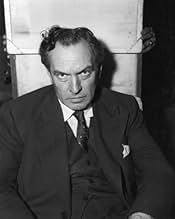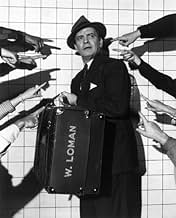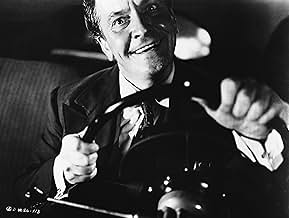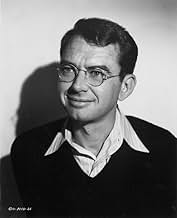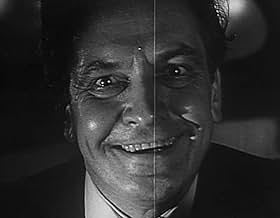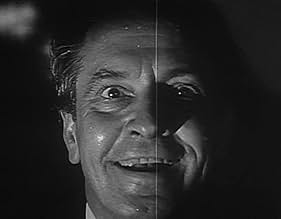Death of a Salesman
- 1951
- 1h 55m
IMDb RATING
7.2/10
1.3K
YOUR RATING
An over-the-hill salesman faces a personal turning point when he loses his job and attempts to make peace with his family.An over-the-hill salesman faces a personal turning point when he loses his job and attempts to make peace with his family.An over-the-hill salesman faces a personal turning point when he loses his job and attempts to make peace with his family.
- Director
- Writers
- Stars
- Nominated for 5 Oscars
- 8 wins & 11 nominations total
Beverly Aadland
- Girl
- (uncredited)
Jeanne Bates
- Mother
- (uncredited)
Gail Bonney
- Mother
- (uncredited)
Roger Broaddus
- Boy
- (uncredited)
Paul Bryar
- Subway Guard
- (uncredited)
Patricia Edwards
- Letta
- (uncredited)
Elisabeth Fraser
- Miss Forsythe
- (uncredited)
Charles Morton
- Subway Passenger
- (uncredited)
- Director
- Writers
- All cast & crew
- Production, box office & more at IMDbPro
Featured reviews
When Death Of A Salesman was still on Broadway critics acclaimed Arthur Miller's play as an American classic and so it remains. There are so many versions out there that you've got so much to compare. And Lee J. Cobb who created the role of Willy Loman managed to get an acclaimed television version made for future generations to see.
I think that Fredric March's interpretation stands up to any that's out there. For one thing at the age of 54 he's the proper age for the part. March fleshes out the Loman character and plumbs his depth of a man who has seen life pass him by and he's running on fumes. He's not going to rise to management in his profession simply on his likability. And for Willy Loman that's the most important thing in the world.
His family which includes wife Mildred Dunnock and sons Kevin McCarthy and Cameron Mitchell stand by him. But McCarthy who since being a high school football hero has led a drifting aimless life is curiously alienated from his father. The source of that alienation is what you see Death Of A Salesman for.
Arthur Miller's work which is a classic about showing middle age with a purposeless existence has so many interpretations. Everyone has there own interpretation of Willy Loman so here's mine. When we're young we all start out with ambitions and dreams. Choices we make at that time determine our fates whether realize it or not. Most of us adjust and try to make a comfortable existence. It's usually our leisure time activities that identify us as individuals. Hobbies, causes, even sports fandom if that's your thing make life bearable. Willy didn't need to be liked, the poor guy needed a hobby.
Fredric March got an Oscar nomination for Best Actor, but lost to Humphrey Bogart for The African Queen. Mildred Dunnock and Kevin McCarthy were nominated in the supporting actress and actor categories. The film also received nominations for Best black&white cinematography and best musical scoring. It did not come home a winner as this was the year for A Streetcar Named Desire. Ironically March as Willy was up against the Broadway Biff Loman who was Arthur Kennedy and was nominated for Bright Victory.
I urge everyone to see all versions of Death Of Salesman as possible. I guarantee you will see as many Willys as there are actors to play him. This is as good as any.
I think that Fredric March's interpretation stands up to any that's out there. For one thing at the age of 54 he's the proper age for the part. March fleshes out the Loman character and plumbs his depth of a man who has seen life pass him by and he's running on fumes. He's not going to rise to management in his profession simply on his likability. And for Willy Loman that's the most important thing in the world.
His family which includes wife Mildred Dunnock and sons Kevin McCarthy and Cameron Mitchell stand by him. But McCarthy who since being a high school football hero has led a drifting aimless life is curiously alienated from his father. The source of that alienation is what you see Death Of A Salesman for.
Arthur Miller's work which is a classic about showing middle age with a purposeless existence has so many interpretations. Everyone has there own interpretation of Willy Loman so here's mine. When we're young we all start out with ambitions and dreams. Choices we make at that time determine our fates whether realize it or not. Most of us adjust and try to make a comfortable existence. It's usually our leisure time activities that identify us as individuals. Hobbies, causes, even sports fandom if that's your thing make life bearable. Willy didn't need to be liked, the poor guy needed a hobby.
Fredric March got an Oscar nomination for Best Actor, but lost to Humphrey Bogart for The African Queen. Mildred Dunnock and Kevin McCarthy were nominated in the supporting actress and actor categories. The film also received nominations for Best black&white cinematography and best musical scoring. It did not come home a winner as this was the year for A Streetcar Named Desire. Ironically March as Willy was up against the Broadway Biff Loman who was Arthur Kennedy and was nominated for Bright Victory.
I urge everyone to see all versions of Death Of Salesman as possible. I guarantee you will see as many Willys as there are actors to play him. This is as good as any.
I saw this film upon its release in 1951, and although only 12 at the time and surely unable to grasp some of the finer psychological points of the drama, I was a pretty 'old' 12 and was already an absolute devotee of fine acting on the screen, having gone to the movies in that pre-TV era 7 days a week from the age of 8 (my favorite actor was Claude Rains). I was mesmerized by Fredric March's performance then, and I still am now, even after seeing Lee J. Cobb, Brian Dennehy, Dustin Hoffman and a few others as Willy Loman. Every other version of the play I have seen seems to fall short in one way or another when compared to this one. There are some errors in other reviews that should be noted in passing: Two of them make reference to this as a TV movie, but it was a regular theatrical release and played the usual movie house circuit of the time. Another states that the film was picketed by the American Legion due to Miller's testimony before HUAC. I can't speak to the picketing, but I certainly don't recall any such thing, and Miller's problems with HUAC came several years after the film played the circuits. Lastly, to this day I do believe that March, Dunnock and McCarthy should have won Academy Awards for their performances. March was beaten out by Humphrey Bogart in "The African Queen", a worthy contender to be sure but one I clearly recall being given more on the basis of the unusual character (for him) played by Bogart. But it was the Year of "Streetcar Named Desire", and if Bogart had not won it, surely it would have gone to Marlon Brando. March had already won two of them and, outside Walter Brennan, no one had won three AAs up to 1951. Dunnock and McCarthy were certainly more impressive than the excellent Kim Hunter and Karl Malden in their respective films and supporting roles. As I said, this was the Year of "Streetcar Named Desire". March was one of the greatest American actors of the 20th century, and incredibly versatile, and of all the true 'star' Hollywood actors of his time, he and Paul Muni had by far the most illustrious stage careers concurrent with their film successes, something that meant a lot more then than it does now. Anyway, this is THE film version of this play, much in the same way that no other version of "Of Mice and Men" really holds up to the Meredith-Chaney version, no matter how hard subsequent versions try!
The main question is, how does the Fredric March version stack up against the Lee J. Cobb version. The answer is very well; it's probably a dead heat. Lee J. Cobb's performance has long been legendary, but March's was a little more emotionally authentic and agonizing.
Some critics objected that his Willy made the man seem insane and that insanity would rule out tragedy as the genre of the play/film. But King Lear went mad in the course of the play, and Strindberg's The Father involves madness in the protagonist. There is no point denying the evidence of the play itself in order to satisfy a theoretical rule that, at the same time, is violated in other plays. And the main evidence is that Willy got so involved with his memories that some of them became hallucinatory, especially in the office scene after he was let go from his job. Yes, there were numerous flashbacks in the play, but other scenes from the past took place in his mind and at times he became disoriented, talking loudly to absent characters such as his brother.
I found the Dustin Hoffman version not on the same level as the Fredric March or Lee J. Cobb version. Hoffman pushed method acting too much and was too young to portray a man in his early sixties.
I saw the Fredric March version in 1951 or 1952. Because of Arthur Miller's defiance of HUAC, the American Legion picketed the film and it was rarely if ever screened after that, until it was reissued as a DVD quite recently.
Some critics objected that his Willy made the man seem insane and that insanity would rule out tragedy as the genre of the play/film. But King Lear went mad in the course of the play, and Strindberg's The Father involves madness in the protagonist. There is no point denying the evidence of the play itself in order to satisfy a theoretical rule that, at the same time, is violated in other plays. And the main evidence is that Willy got so involved with his memories that some of them became hallucinatory, especially in the office scene after he was let go from his job. Yes, there were numerous flashbacks in the play, but other scenes from the past took place in his mind and at times he became disoriented, talking loudly to absent characters such as his brother.
I found the Dustin Hoffman version not on the same level as the Fredric March or Lee J. Cobb version. Hoffman pushed method acting too much and was too young to portray a man in his early sixties.
I saw the Fredric March version in 1951 or 1952. Because of Arthur Miller's defiance of HUAC, the American Legion picketed the film and it was rarely if ever screened after that, until it was reissued as a DVD quite recently.
This is the version people of my generation grew up on; it played on TV in the 50's, and being black and white non-widescreen and uncensorable, what we saw was what was filmed. Frederick March hammmed it up a bit, but in retrospect the play itself is hammmy (emotion-charged). It has been said Arthur Miller disliked the film, particularly the realistic representation of Willie's reveries and imaginings. Kevin McCarthy did a fine job as Biff. I loyally refused for years to watch Dustin Hoffman's version, but when I finally gave in I enjoyed his substantially different interpretation. But if he differed from March, then it follows March differs from him. In short, a whole other way of enjoying the greatest American soap opera ever penned.
Like many people ,I had seen the Schlondorff version starring Hoffman first,and I did like it.
This one should not be overlooked though :Arthur Miller's play,with its ceaseless to and fro between present and past , imaginary world and reality was not easy to transfer to the screen,and Laslo Benedek's directing is quite estimable:the scenes in the present are dark and make the house look like a tomb (notably when Willy comes back home) whereas the past which seems so bright is filmed in plain day light (the scene when young Biff and Happy polish the car );the subway is a good place to locate the events when willy has been fired;ditto for the final scene ,with all these 'living' night lights.The one thing which is passed over in silence is the boys' attitude after the funeral:Happy is "staying right in this city and gonna beat this racket,(...) and gonna win for him" whereas Biff "knows who he is" and that he perhaps will not never be able to settle down and take orders from somebody .
The cast is sensational:Fredric March gives a tormented performance ,switching back and forth between the extremes:sometimes proud of his athlete three colleges will take,often humble and bent in the office,where his boss is more interested in his tape recorder than in his salesman's future ;Mildred Dunnock is the patient mom,who trusts her dear husband ,even when the future seems bleak and he loses his mind ;Cameron Mitchell is Happy ,his dad's optimistic side ,a lady killer who thinks everything will work out fine (too bad his part is reduced in the last scene).Kevin McCarthy (film debut) is my favorite and he thoroughly deserved his AA nomination (he lost to Karl Malden 's Mitch in " a street car named desire): I love the way he talks about Bernhard ("he is liked ,but he is not well liked" ) ;he can be hilarious -the brief moment when he apes his teacher's lisp- or deeply moving when he breaks crying in his dad's arms ("Pop! I'm dime in a dozen and so are you!")His performance is at least as mind-boggling as that of John Malkovich thirty years later.
This one should not be overlooked though :Arthur Miller's play,with its ceaseless to and fro between present and past , imaginary world and reality was not easy to transfer to the screen,and Laslo Benedek's directing is quite estimable:the scenes in the present are dark and make the house look like a tomb (notably when Willy comes back home) whereas the past which seems so bright is filmed in plain day light (the scene when young Biff and Happy polish the car );the subway is a good place to locate the events when willy has been fired;ditto for the final scene ,with all these 'living' night lights.The one thing which is passed over in silence is the boys' attitude after the funeral:Happy is "staying right in this city and gonna beat this racket,(...) and gonna win for him" whereas Biff "knows who he is" and that he perhaps will not never be able to settle down and take orders from somebody .
The cast is sensational:Fredric March gives a tormented performance ,switching back and forth between the extremes:sometimes proud of his athlete three colleges will take,often humble and bent in the office,where his boss is more interested in his tape recorder than in his salesman's future ;Mildred Dunnock is the patient mom,who trusts her dear husband ,even when the future seems bleak and he loses his mind ;Cameron Mitchell is Happy ,his dad's optimistic side ,a lady killer who thinks everything will work out fine (too bad his part is reduced in the last scene).Kevin McCarthy (film debut) is my favorite and he thoroughly deserved his AA nomination (he lost to Karl Malden 's Mitch in " a street car named desire): I love the way he talks about Bernhard ("he is liked ,but he is not well liked" ) ;he can be hilarious -the brief moment when he apes his teacher's lisp- or deeply moving when he breaks crying in his dad's arms ("Pop! I'm dime in a dozen and so are you!")His performance is at least as mind-boggling as that of John Malkovich thirty years later.
Did you know
- TriviaAccording to Arthur Miller, in a 2000 essay entitled, "Are You Now Or Were You Ever?" Columbia asked Miller to sign an anti-Communist declaration to ward off the threat of picket lines by the American Legion at theaters showing "Death of a Salesman". He refused. Instead, Columbia made another movie, a short film entitled "Life of a Salesman" to be shown with it. The short consisted of business professors from City College praising sales as a profession, and denouncing the character of Willy Loman. Miller wrote: "Never in show-business history has a studio spent so much good money to prove that its feature film was pointless."
- ConnectionsFeatured in The Light Bulb Conspiracy (2010)
- How long is Death of a Salesman?Powered by Alexa
Details
- Release date
- Country of origin
- Official site
- Language
- Also known as
- Smrt trgovackog putnika
- Production company
- See more company credits at IMDbPro
- Runtime
- 1h 55m(115 min)
- Color
- Aspect ratio
- 1.37 : 1
Contribute to this page
Suggest an edit or add missing content

